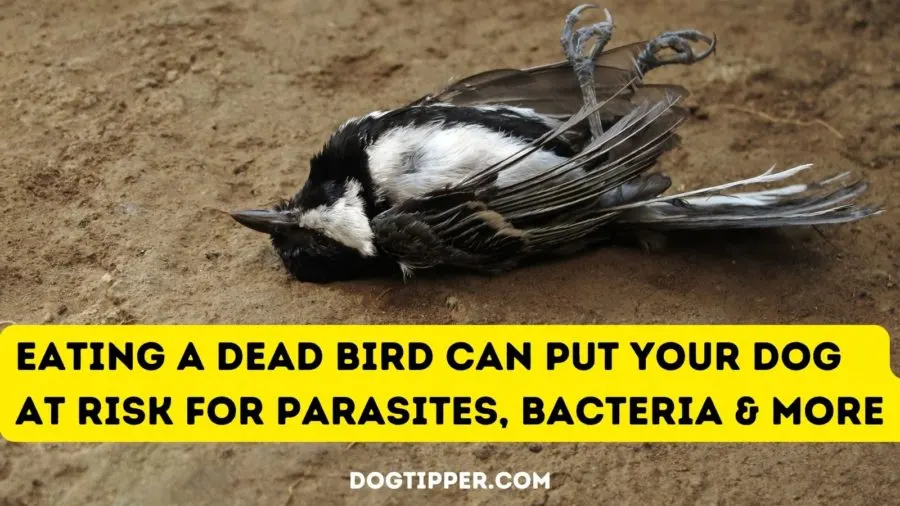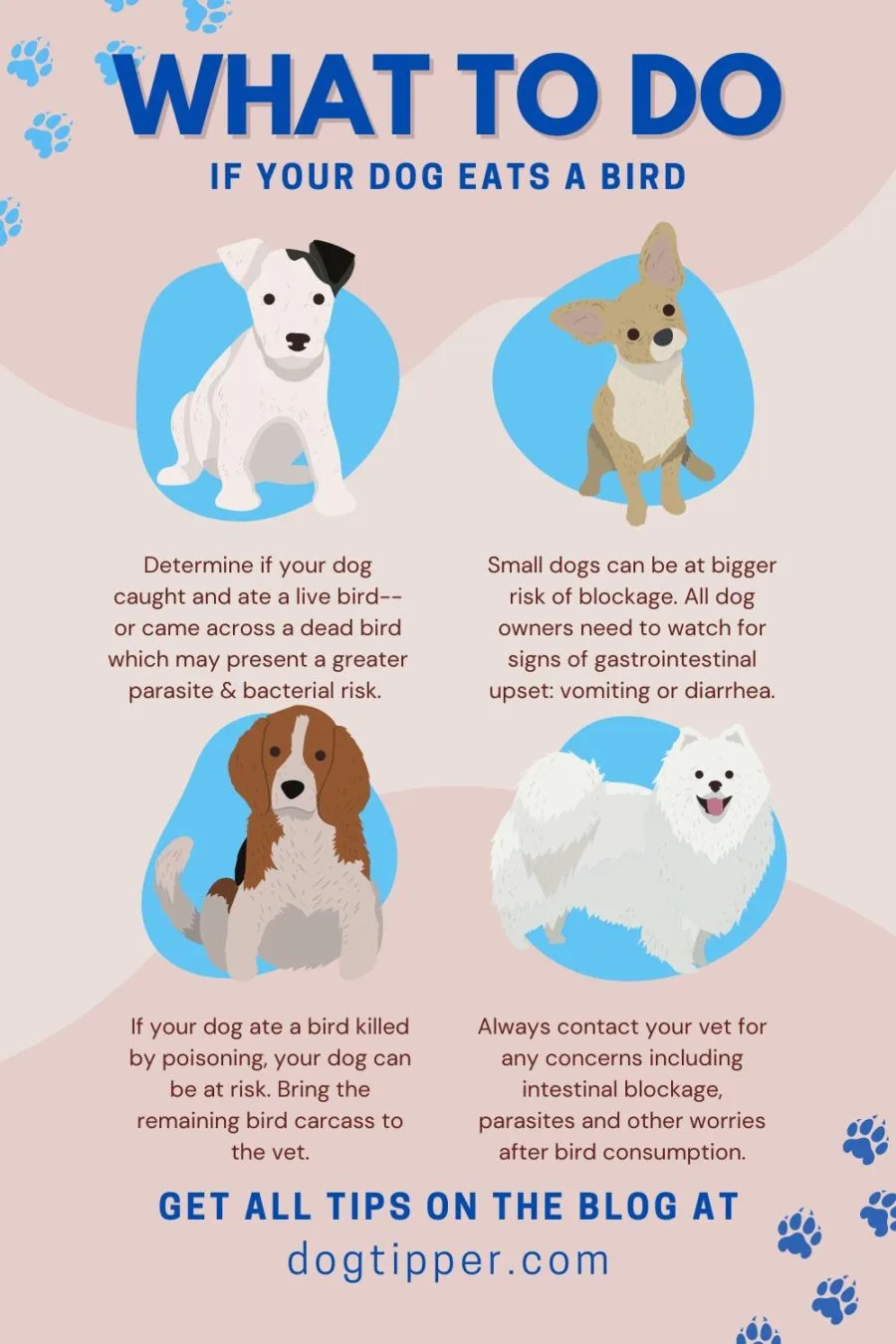You’re walking along and suddenly your dog stops, apparently eating something–and it turns out to be a dead bird. Or perhaps your dog chases a live bird and, in spite of your best efforts, consumes part of the bird before you can reach him.
What should you do? Do you need to worry? We’ve reached out to several veterinarians to answer that very question, one that just about every dog lover has had at some time or another.

What to do if your dog eats a bird
If you realize your dog has eaten all or part of a bird, the first question you need to ask yourself is was this bird dead or alive when found by your dog?
Although you may feel far worse about your dog catching a live bird, killing it and eating it, that’s the best option when it comes to the potential risk to your dog.
Dr. Corinne Wigfall, BVMBVS (Hons) and BVMedSci (Hons), veterinary spokesperson for Spirit Dog Training, notes, “It is not uncommon for dogs to eat birds or other small mammals when out for a walk or in the garden.”
And most of the time, that’s just fine.
But not always.
“It’s safe to say that, in the majority of cases where your dog eats a bird, your four-legged pal will be just fine as they won’t face any consequences for it,” says Dr. Sabrina Kong, DVM.
“Unlike amphibians, birds do not pose any toxic risk to your dog in case he eats one (dead or alive); however, there are still a few other possible risks that you may want to keep an eye on during the following days of your dog eating a bird,” points out Dr. Kong, DVM at WeLoveDoodles. “Some dogs’ digestive systems may not be suited for consuming raw meat which could lead to stomach problems like diarrhea and vomiting.“
Even if your dog has an iron stomach, there’s another risk: parasites. Birds, like other wildlife, carry a wide variety of internal parasites. Giardia, a protozoal parasite, can be carried by birds and caught by dogs. (And, take it from us, you do not want your dog to contract Giardia. Barli had a bout of Giardia once as a puppy, teaching us firsthand that, yes, there is such a thing a projectile diarrhea.)
Dr. Jamie Whittenburg (DVM), lead veterinarian at SeniorTailWaggers.com and Director of Kingsgate Animal Hospital, a full-service animal hospital in Lubbock, Texas, explains, “The risk of eating a live bird is primarily parasitism. Just as with bird droppings, eating a bird may transmit parasites to your dog. Gastrointestinal upset may also occur.”
How Big is Your Dog?
Your dog’s size–and the size of the bird–may also play a role in the after-effects of your dog’s bird binging.
Dr. Georgina Ushi Phillips, DVM, Advising Veterinarian and Writer for NotABully.org, notes that digestive issues are the most likely issue. “Eating an entire bird could cause GI upset like vomiting and diarrhea, just as you would expect with any large amount of novel food. However, whether or not GI upset occurs will depend on the size of the bird and the dog.“
Although Dr. Phillips explains that most of the time, the bird should pass normally through your dog’s digestive track, “Another concern is a blockage and again the size of the bird and the dog will be a big factor but a smaller dog that tries to eat a large bird could have trouble actually swallowing the bird.“
My dog ate all the bird bones, too!
Even if your dog doesn’t have a sensitive stomach–and is plenty large enough to eat a bird with no issues–there’s still a potential risk of problems due to consuming the bones of the bird.
Dr. Kong explains, “Bird bones are light and often easily digested with the strong acid in the stomach, however, sometimes bones can remain undigested and create a foreign body in the stomach or intestines. There is also a risk of intestinal perforation if the bones are sharp-edged or fractured as they pass through the digestive system. Often surgery is needed to remove these bones.”
If you are worried, give your veterinarian a call.
What if my dog eats a dead bird?

OK, what if your dog comes across a dead bird and proceeds to snack…what should you do?
The problem with your dog eating a dead bird is more complicated than eating a live bird for two reasons:
- How long has the bird been dead?
- How did the bird die?
If the bird has been dead for a considerable time, that’s a risk.
Dr. Wigfall explains, “The first thing to assess is the size of the bird and the state of decay. Any signs of decomposition and your dog may develop gastrointestinal signs like vomiting and diarrhea. These are usually mild and resolve within 1-3 days.”
The exposure and decomposition present the opportunity for parasites, maggots and bacteria to enter the body of the dead bird–and be consumed by your dog.
“Your dog could also get sick if the bird happens to be infested with some pests or bacteria (highly probable if the bird has been dead for a long time), not to mention another more simple but likely risk to appear as it is an intestinal blockage, especially if we’re talking about a large bird,” cautions Dr. Kong.
Dr. Chyrle Bonk, DVM, a veterinarian working with hepper.com, explains, “The most common [risk] would be Salmonella that lives in the bird’s digestive system. However, most dogs are able to handle this bacteria better than humans do. The real risk is for dogs with other health conditions.”
And just plain meat spoilage is another potential risk. Dr. Whittenburg notes, “Botulism can be an issue but it is rare. If your dog shows any signs of illness after consuming a dead bird, please take them to the veterinarian as soon as possible.”
How did the bird die?
If the bird your dog consumed died because it flew into a window or was hit by a car, that’s not such a risk to your dog–but what if the bird died of poisoning?
“Always be aware of signs that advise that chemicals have been sprayed or bait laid to kill of pest populations,” says Dr. Kong. “If a bird has ingested a poison, it will still be present in its tissues/gastrointestinal tract and can cause the same effects in your dog if eaten in strong enough quantities.
“If concerned at all contact the pet poison helpline or your nearest veterinary clinic for further advice on what to do. Take photographs or bring any remaining carcass to the vet clinic for the veterinary team to be able to gather more information that could help in the treatment of your dog.”
Whether you enjoy feeding the birds at your home or just run across birds on your daily dog walks, please keep an eye out for birds–both dead and alive–and prevent your dog from consuming one. Both the birds–and your dog–will thank you!
Pin it to remember What To Do If Your Dog Eats a Bird

- Review: Jimmy BX7 Pro Anti-Mite Vacuum Cleaner - December 16, 2024
- 🎉 GIVEAWAY: Lord of the Pets Portrait of Your Dog! - November 26, 2024
- Review: Lord of the Pets Portraits - November 17, 2024
